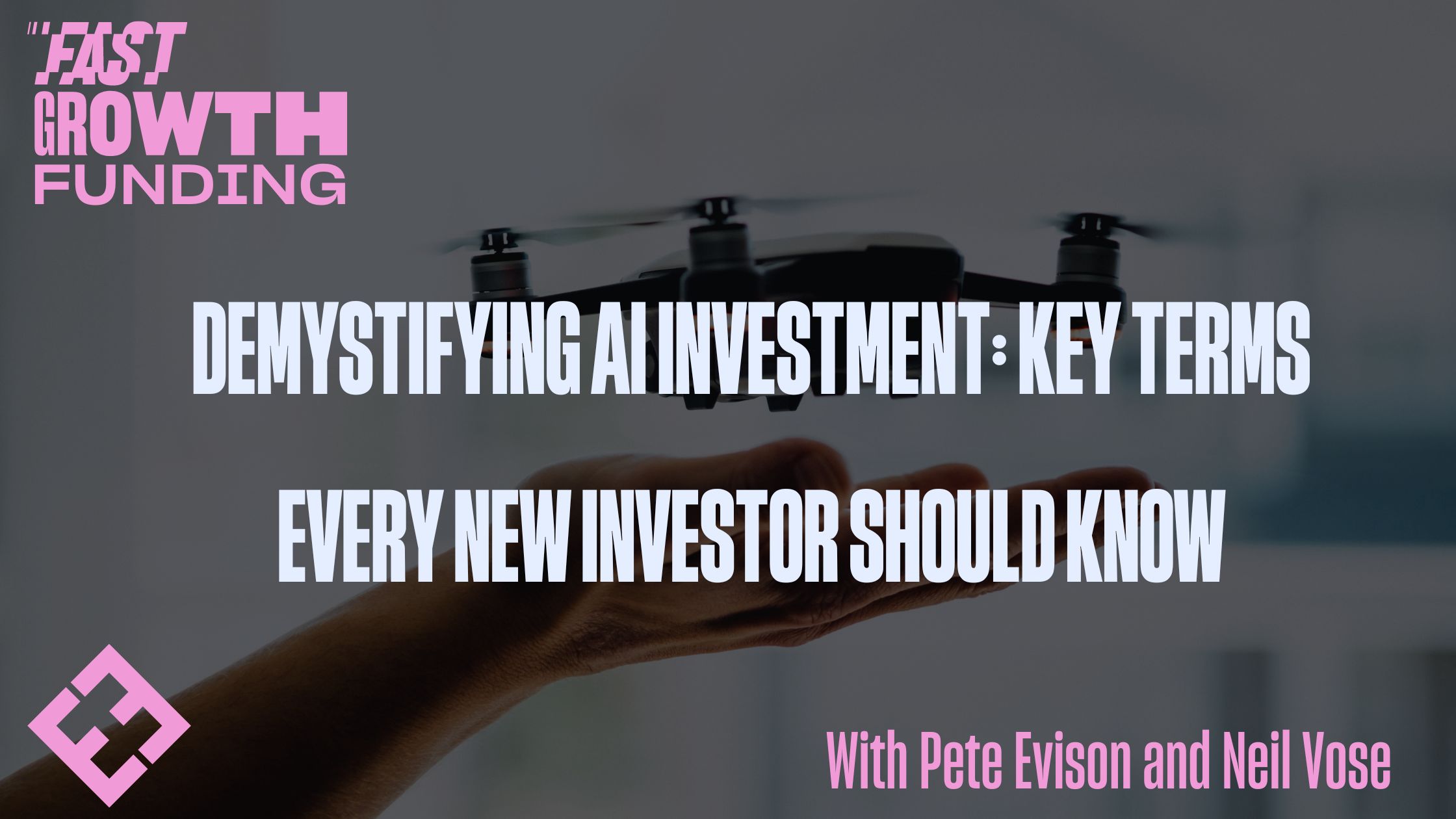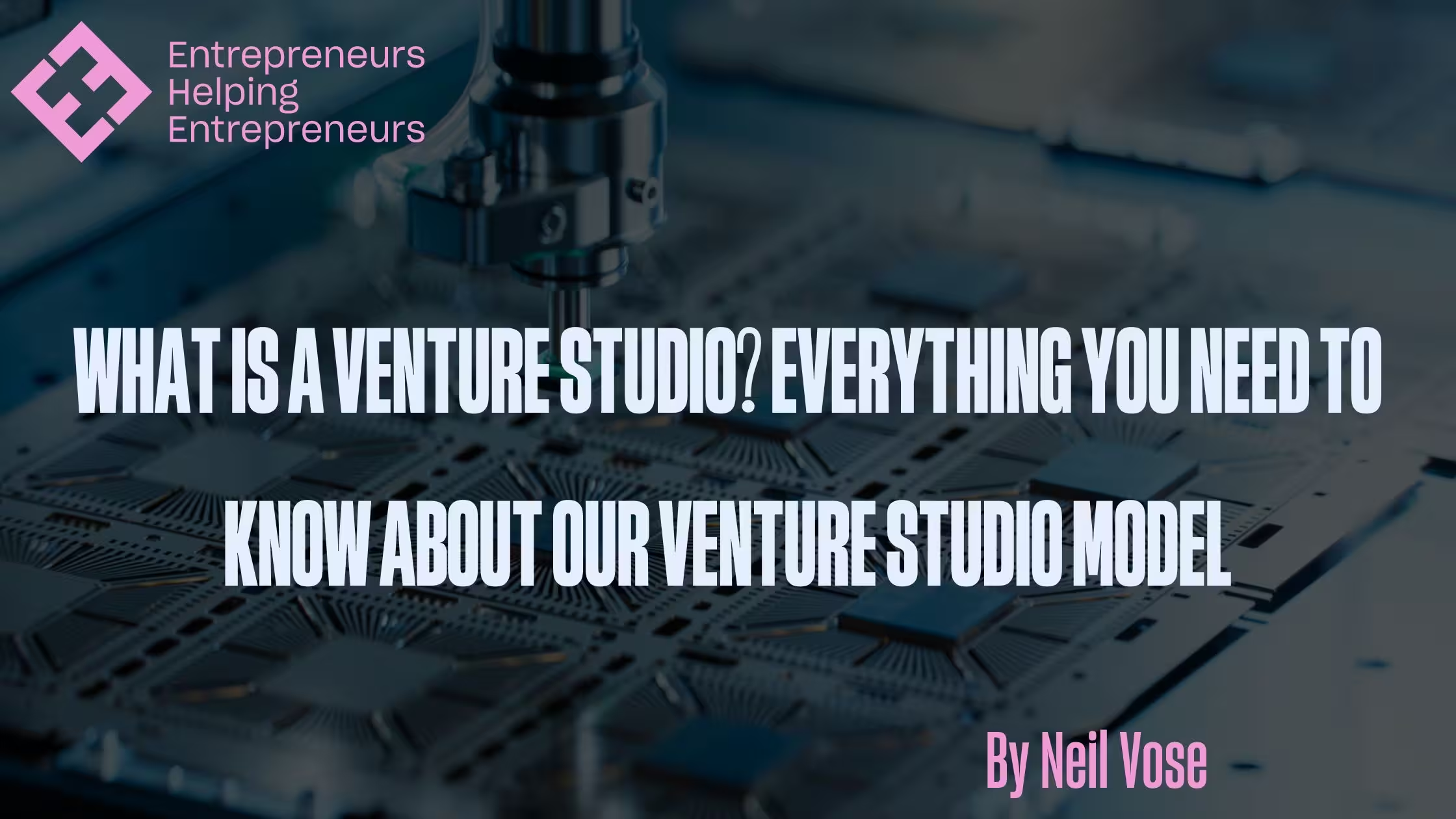News & Insights


Demystifying AI Investment: 4 Key Terms Every New Investor Should Know
With Pete Evison and Neil Vose
If you’re a new investor or you’re dipping your toes into investing in AI-driven companies, you’ll likely encounter a lot of jargon – some of which can feel overwhelming or outright confusing.
As part of EHE Ventures’ new mission to demystify AI investments, we decided to do some jargon-busting on the Fast Growth Funding podcast. Our very own Pete Evison and Neil Vose joined us to breakdown some key terms you’ll probably hear a lot as a new AI investor.
If you’ve followed our previous blogs and podcasts, you might be familiar with some of them already!
In this blog, we’ll share what these key terms mean. By understanding their core meaning, you’ll be able to make smarter investment decisions.
Enterprise Investment Scheme (EIS)
We recently revealed our new EIS-qualified fund for AI early-stage and growth investments. If you’re wondering why the term “EIS-qualified” forms a core part of our messaging, Pete aptly breaks down what it means and why it’s beneficial for investors.
Pete: “The government rewards us as investors for investing in high-risk companies, i.e. startups, because it wants to accelerate enterprises and spur economic growth. So, you get tax benefits [income tax relief] for investing in EIS funds over a certain timeframe [4 plus years].”
Tax efficiency is a crucial part of investing – you want to spend your money efficiently and get as much return as possible. This means that any investor dipping their toes into high-risk ventures needs to balance that risk with some form of reward – which is where the EIS comes in.
We understand how important this is, which is why our fund focuses on EIS-qualified companies.
AI-first investing
You may assume that an AI fund such as ours invests in pure-play AI companies. However, we are looking for companies that have AI at their core and are using it to lead and drive their companies. We want to work with AI-first companies – businesses harnessing it to scale, drive operational efficiencies, and, of course, innovate.
Neil: “AI investing is very much bucking the trend in terms of the amount of opportunities and decent deal flow, particularly in Europe and within the UK. So we’re looking to find the next generation of AI winners. These winners aren’t necessarily pure-play AI companies, but they’re using the application of AI technology to disrupt a particular industry, and as a core part of their growth strategy. It’s even better if it’s a company which already has some initial traction and is topping that up with AI integration. That’s a particular sweet spot for us.”
At the moment, investing in AI technologies and applications can be a huge risk as many companies are hopping onto the bandwagon without proper innovation. As a result, investors need to lift the hood and look at what’s underneath.
As an investor, it’s a good idea to look out for companies leaning into AI as a means to accelerate their processes and future-proof their business. Companies whose founders have the right mindset, thought leadership and vision to ride the current technological wave.
Due diligence (DD)
This is one term that often pops up in the early stages of the investment process. For the average founder, getting grilled by investors on every single detail of your company can feel frustrating at times.
We know how that can feel, but we also know why it’s so important for investors to ask these challenging questions and thoroughly vet each opportunity that comes their way.
Pete: “During the DD process, we’re not looking for reasons not to invest. From a founder’s perspective, it might seem like we’re trying to poke holes in the business. But that’s not the case. We’re actually trying to spot areas where the business can be improved, and we’ll inject people into this process to help these founders get ready for investment and growth.
That’s the best part of our job – rolling our sleeves up, getting our hands dirty, and helping founders.”
From an investor’s perspective, if you’re making multiple direct company investments, you have to do your own due diligence across each of these companies.
This isn’t always viable due to time constraints and the investors’ ability to do their own DD, which is why funds like ours exist. However, it’s worth noting that sinking money into any fund requires a high level of trust. You have to be able to trust the people who manage the fund and be confident that they can invest your money better than you could have done.
The due diligence we conduct gives our investors this confidence. We’ve got the badges and scars, which means we can quickly spot the risks and opportunities and ultimately help the businesses we invest in to scale quicker.
The capitalisation table
Also known as the cap table, this is an important factor for both investors and founders alike. Neil brilliantly sums up what it means and why it’s a conversation that should be had at the very early stages of the investment process.
Neil: “At the most simplistic level, the cap table is a spreadsheet which outlines who has what current percentage equity stake in a business. It’s particularly important at the early stage, because the equity stake typically gets diluted as the business goes through different funding rounds and other investors come on board.
So, founders need to have a strategic approach and a clear picture of what the cap table will look like at the end of the funding rounds. Otherwise, it can create so many human resources and investor relations problems further down the line.”
Additionally, investors need to check if the critical people in the business are properly incentivised. Do the founders have an Enterprise Management Incentive (EMI) in place to retain and incentivise the key players to drive business growth and profit?
Normally, this comes in the form of shares, which further affects the cap table. Therefore, founders need to hold back enough equity for this purpose of incentivising, and for future funding rounds as well.
Final thoughts
EHE Ventures is here to help investors cut through the jargon, vet new opportunities and invest their money as efficiently as possible.
If you’d like to find out more about our new fund for UK-based early-stage and growth AI investments, register your interest here.
Tags: AI investments, Funding, Investors
Join our community
As well as investing in and mentoring businesses, we’re creating a community of entrepreneurs, investors and technology enthusiasts.
Become part of the EHE community and benefit from:- Growth focused 'how-to' guides
- Podcast interviews with seasoned entrepreneurs and investors
- Invitations to our exclusive webinars
- Ask questions to our expert Investor Panel







